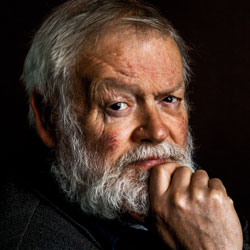For Lucy McDiarmid
I have been thinking about the music for my funeral –
Liszt’s transcription of that Schumann song, for instance,
‘Dedication’ – inwardness meets the poetry of excess –
When you lead me out of your apartment to demonstrate
In the Halloween-decorated lobby the perfect acoustic
Of the stairwell, and stand among pumpkins, cobwebby
Skulls, dancing skeletons, and blow kisses at the ceiling,
Whistling Great War numbers – ‘Over There’, ‘It’s a Long,
Long Way’, ‘Keep the Home Fires Burning’ (the refrain) –
As though for my father who could also whistle them,
Trench memories, your eyes closed, your head tilted back,
Your cheeks filling up with air and melody and laughter.
I hold the banister. I touch your arm. Listen, Lucy,
There are songbirds circling high up in the stairwell.
Notes on the Poem
How does a poetry collection come to be titled as it is? How, for example, does an eponymous poem relate to a collection as a whole? We have a fine opportunity to consider this with the poem "The Stairwell", from Michael Longley's 2015 Griffin Poetry Prize winning collection of, yes, the same name. Addressed more to writers than readers, but still interesting to those of us grateful to enjoy the fruits of poets' labours, this piece on titling poems and poetry collections (as well as novels) by poet and short story writer Kathryn Simmonds is thought provoking. She posits, "Titles force us to frame our work in a particular way, to give the reader some kind of steer, however loose, as to how it might be read." As readers, should we go with this and implicitly trust this assumed guidance, or should we resist it and come up with our own interpretations? If we do agree to assume the poem "The Stairwell" is our steer through the entire collection, how is it directing us? The 2015 Griffin Poetry Prize judges start us on this path:"Part of the excitement and pleasure of Michael Longley’s The Stairwell comes from the quiet unpredictability of what his language does. It is modest and unassuming, yet bold in its deceptively small meditations."We've observed in other poems from this collection - "Boat" and "Glass Box" - that ostensibly simple pleasures and objects are actually rich in symbolism and meaning. The stairwell in this poem is a specific location filled with delightful features, from festive decorations to perfect acoustics. The stairwell also evokes memories: fairly recent ones of shared happiness with someone beloved and ones further back in time. Whether or not you've yet read the entire collection, it's likely this poem is representative of "deceptively small meditations" throughout that are deeply significant and revelatory.
